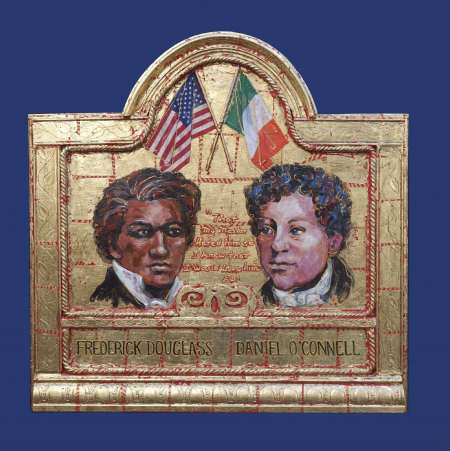“That my master hated him so, I knew I would love him. . . ”
Born into slavery in 1818, Frederick Douglass became one of the great abolitionists of the 19th century. Through determination, oratory eloquence and the written word, he helped shape the conversation about race and slavery in the United States and Great Britain.
At the age of 18 Douglass fled slavery in Maryland and escaped to New Bedford, Massachusetts. He met and was influenced by the abolitionist and orator William Lloyd Garrison, editor of the newspaper The Liberator. Douglass was self-educated and soon became a strong anti-slavery advocate on both the abolitionist speaking circuit and by establishing The North Star, his own newspaper. He was only 27 years old when he wrote his first autobiography Narrative of a Slave’s Life in 1845. During the Civil War, Douglass met with Abraham Lincoln at the White House where he urged the President to work more swiftly on emancipation and encouraged the recruitment of Black men for the Union army. After the War, he continued to battle for equal rights for African-Americans and voting rights for women.
Daniel O’Connell was a revered leader in the effort and emancipation of Catholics from the Church of England. He was also known in Ireland, England and the U.S. as a staunch abolitionist of the early 19th century. He was outspoken in his opposition to slavery.
In 1829, at an anti-slavery meeting in London, he declared, “Of all men living, an American citizen who is the owner of slaves is despicable… Slavery is a foul stain upon your character.” For his strong opinions and his powerful oratory he was known as “Liberator and Defender” of Ireland.
Frederick Douglass first met Daniel O’Connell on a trip to Ireland when he was 28 and O’Connell was 70. Douglass had been invited by the Quaker community in Dublin to speak at one of a series of anti-slavery lectures across Ireland to raise funds for the abolitionist movement in America. Douglass had heard of O’Connell’s abolitionist reputation when, as still a slave, his owner cursed the name of the Irishman. Douglass later said: “that my master hated him so, I knew I would love him.” He knew of O’Connell’s reputation as a great orator, but thought that this ability to address “twenty or thirty thousand and be heard by most of them” was surely an exaggeration. But when Douglass heard his “musical voice”, he wrote, “His power over an audience is perfect.”
After meeting O’Connell, Douglass wrote to Garrison that, as a result of his visit abroad, he realized the abolitionist crusade was part of a wider struggle for social justice and embraced the concept of universal suffrage that was so eloquently expressed and practiced by his new friend, Daniel O’Connell.

